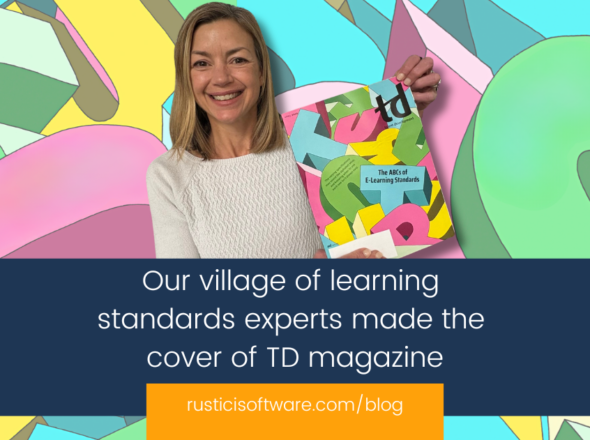Just this week, we celebrated the one year anniversary of Rustici Software acquiring JCA Solutions. This occurred when many organizations were still firmly fully working remotely. Online education, as an industry, had gathered significant momentum, and life was very busy even as we were staying home. However, there had been a large and very noticeable gap in our schedules at this same time that I felt significantly, both for business reasons and personal: DevLearn 2020 had been fully virtual. This wasn’t the first conference, or the last, to do so, and it didn’t represent a significant amount of the travel that I did for the organization (which worked out to approximately eight weeks a year of various conferences and on-sites). But for me, DevLearn was the show I looked forward to the most. As a primarily telecommuting organization back then, this was one of our planned annual gatherings for anyone on the team that could make it. So many of the people we spent all year working with in virtual standards groups would be there. Several of our customers from both my previous organization and Rustici would be vendors there. It’s the best place I could imagine getting back out in the world and interfacing with customers in person once again, and the excitement mounted as the days to leave ticked down.
The Road To DevLearn
The first improvement was visible before we even left our offices. The mobile experience attached to the conference was the best it’s ever been, and engagement there was surprisingly high. Seeing chatter there and outside the normal social media platforms meant there was a much more focused feed to read about what interested people and what excitement was happening now.
For the first time, I got to share a booth with people who were, until very recently, my most important competitors. People who I respected from afar, people who I would seek out to communicate and discuss the state of the industry with, people whose professional opinions mattered to me as leaders in our shared space, and people whose company I genuinely enjoy. Long before the acquisition, it carried a lot of weight that people like Chris Tompkins and TJ Seabrooks, who I spent so much time in person with over the years, had been so genuine and practical throughout our interactions. Due to the challenges we’ve all been facing this last year, this was also a chance for meeting some coworkers face-to-face for the first time. Our own “Just Ask Joe” Donnelly and the wide array of SCORM material he’s written over the years I’d pored over, applauded, argued about, and now I’ve even done webinars with him, but finally I was able to share the same physical space. It matters, it’s different. Tammy, who entered the Managing Director role right as we were acquired and needed to learn my business even as she was taking on so many new responsibilities within Rustici. As someone who’s telecommuted the vast majority of the last 15 years, blocks of concentrated face time have proven to be extremely valuable in any setting, and the conference floor proved no different.
Boots on the Ground
The vast majority of my regular hours conference time at DevLearn for the last five years has been on the expo floor, and this year was no different. But there is a significant difference with what banner you’re under. As JCA, so many of the conversations were always “who are you/what do you do” first. Building solutions that power other solutions and are mostly invisible to end users isn’t a thankless task, but it often doesn’t come with a lot of notoriety, no matter how many folks you have integrated. As Rustici, though, I can’t even count how many times the phrase “oh, you’re the SCORM Cloud people! I love that tool!” was uttered. It’s very rewarding to be a part of something both visible and loved.
The floor conversations with passersby were a little different from years past. On the whole, the average person who stopped to talk was more informed about learning technologies than I’ve experienced in years past. While not everyone knew what cmi5 was, nearly everyone understood enough to be able to identify SCORM and xAPI as relevant independent standards, and the average person felt more comfortable with the basics of what xAPI is. Where people were new to the industry in general, or xAPI and cmi5 specifically, the conversations tended to have more shared technology footing to get people familiar with the concepts sooner. It felt like people in our industry have been working extra hard during this pandemic on both breadth and depth of understanding of the larger ecosystem.
There are a lot of faces I expect to see most years, and some of the regulars that were missing this time around were more keenly felt. Happily, there were customer faces, both old and new to DevLearn, that came by to greet me under the new banner and that made a big difference. Several folks who work on the xAPI and cmi5 standards were there, and while everyone was quite busy, everyone spent the time they could to catch up.
The More Things Change
As for the parts that were the same, I appreciated their consistency as a grounding force. Same expo days and hours in the same space at the Mirage that it’s been for the last several years gives a lot of familiarity and consistency to the routine of doing shows. After almost two years of no shows or even in-person engagements, and the first time with a new company (even if I am still doing much the same work as before), knowing what I was going into spatially and structurally meant that my focus was much more on what we specialize in and not the mechanics of how things happen at the show.
A silly thing that I appreciate about DevLearn: the little events that happen on the floor. The mid-day ice cream social almost always ends up starting a conversation or two around the freezers. The cocktail hour at the end of the first day is much the same. Created spaces that naturally encourage people to gather and chat outside of the main booth space, or to just move around the expo floor, opens people up to conversations that they might not stop at our booth and have. This isn’t just because I get my children worked up and excitedly shouting when they hear the ice cream truck song coming down the road so that I have an excuse to run out there with them because I’m the one that really wanted ice cream, but it doesn’t hurt.

George and Chris presenting at DevLearn 2021.
Part of the familiarity of the setup bled over to the presentations as well. Chris and I made a cameo with the xAPI Cohort (featuring the Rustici cmi5 mascot The Rock!), and also did a full hour session presentation on cmi5 (and how it straddles the divide across SCORM and xAPI’s functionalities) right after the expo closed. Good attendance and great questions at the end, even with other learning technology-specific talks happening the same time slot. DevLearn’s audience is a good fit for what we’re passionate about, and the direct feedback around the speaking slots continues to confirm it. Thanks, DevLearn, for giving us a meaningful venue to engage with all these people about what drives us in this industry.
The newest item of all to me as part of doing a show with Rustici is what we all fondly came to refer to as “Tara’s magic list.” Our marketing department lead, Tara Morey, puts together a comprehensive list of everything to bring and everywhere and when to be. While I’ve planned with my team for conference goals and needs previously, it was at a tiny fraction of the thoroughness that she brings to the effort, and the results really show. On the floor, the conversations get busy, people have events they need to get to, and a shared set of knowledge for who is staffing what when plus an occasional alarm to keep everything timed means that each of us in the booth were able to look out for each other. An enormous help that I had no appreciation for until I worked under it. Huge thanks, Tara!
There and Back Again
I may wear a different company name on my badge, but this last year has been a transition far more successful than I had any right to expect, and I’m pleased to carry it. DevLearn continues to be a place I look forward to seeing friends and customers, and with our tagline, “Ask Us Anything,” it meets right up with what I’ve always been going to that conference to do. For me, the stories the customers are telling and the challenges they’re facing are what drive so much of what I think about what we build and how we support everyone. After two years, hearing those stories in such a concentrated fashion is incredibly refreshing and brings with it a renewed energy to drive things forward.


